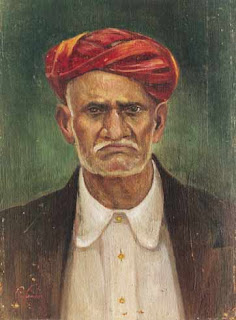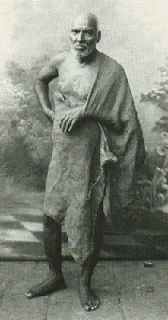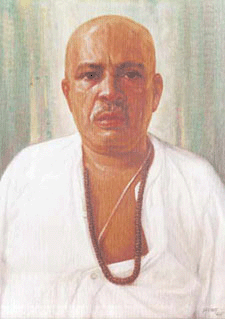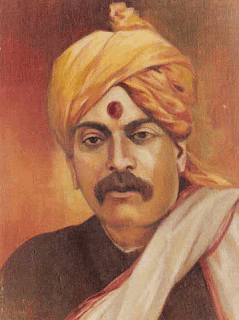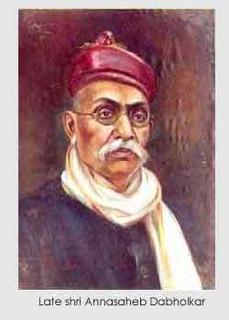Tatya Kote Patil – Tatya Kote Patil’s family was one who loved Baba for Himself and not for what they got from His divinity. Tatya was the first amongst the devotees who was fully soaked in the gentle rain of Baba’s love. Tatya Kote patil was a little boy of six or seven years old when Baba first came to Shirdi. Tatya used to call Baba ‘Mama’. Baba used to treat him like His own nephew. Baba used to watch his childish behavior with motherly love. Sometimes Bayajabai scolded Tatya for his unseemly behavior, but Baba would remonstrate with her to leave Tatya alone. Baba used to call Tatya “Tatya or Kotya or Kote chaa Ghod Mukhya (Horse-faced-one)” Tatya received Rs. 35 everyday from Baba. The Income-tax authorities levied tax upon the regular recipients of Baba’s daily doles such as Tatya Patil, Bayyaji Patil and Bade Baba. Bayaja Bai Ma – The moment Baba saw Bayaja Bai, he said, “She has been my sister for the last seven births”. Right from the time she met Baba as a young lad sitting under the neem tree, the parental feelings were aroused for Baba as if He was her son. Mrs. Bayaja Patil showered love and cared for young Baba who abruptly would rush to the cactus jungle, an unknown old isolated place. Bayaja Bai, used to go to the woods every noon with a basket on her head containing bread and vegetables. She roamed in the jungles koss (about 3 miles) after koss, trampling over bushes and shrubs in search of the mad Fakir, and after hunting Him out, fell at His feet. The Fakir sat calm and motionless in meditation, while she placed a leaf before Him, spread the eatables, bread, vegetables etc. thereon and fed Him forcibly. She give Him bread (Bhakari) and salty smash of chana dal (Jhunka) and onion and chilly, simple food items which Baba cherished most. Baba also used to pay a visit to Patil’s house to have lunch (bhojan) of His choice. Later Saibaba used to go for bhiksha (begging food) to selected houses. One such place was Bayaja Bai’s place. Baba used to stand outside the gate and say loudly “Abade Ajaad Bayaja mami, Roti lao” (God bless you Mother Bayaja, please give bread). Then Bayaja Bai used to invite him into the house but Baba sat in the veranda only. Tatya used to play with Baba against the wish of his mother. Baba never felt for the child like behaviour of Tatya. Bayaja Bai is remembered for her service to Sai with or without knowing his divinity. When Bayaja Bai, became physically weak due to old age and was not in a condition even to get up from bed, Baba ordered Tatya to remain at the bedside of his mother and do service to her. Now and then He would send Tatya’s close associates like Shama also to be with Tatya. Bayaja Bai was nearing her end. She wanted to see Baba once. Immediately, Baba appeared near her head. His appearance at this last moment gave her divine bliss. Some unexplained joy came to her. She felt that her Atman was happily going towards heaven. Perhaps, this feeling was due to the complete divine darshan Baba gave her. She wanted to say something but words did not come out of her. She took her son Tatya’s hand and put it on Baba’s hand. Having understood her thoughts, Baba assured her that he would look after Tatya from that moment more than his life. She knew that his words were God’s words. After hearing those words from Baba, her Atman left her body and merged in the universe. When Bayaja expired Baba lamented over her demise. So was the unthinkable tie of love between Bayaja Bai and her family, and Baba the love incarnate. Wonderful was her faith and service. Her service, Upasana or Penance, by whatever name we call it, was never forgotten by Baba till his Maha Samadhi. Remembering fully what service she rendered, Baba benefited her son magnificently. Both the son and the mother had great faith in the Fakir, Who was their God. Baba often said to them that “Fakiri (Mendicancy) was the real Lordship as it was everlasting, and the so called Lordship (riches) was transient”. The present generation of Patil family, still observe meticulously and very religiously the ritual of giving offerings of Thali (Naivedya) containing the above mentioned food items to Baba at Dwarakamayi. Upasani Baba – Among the eminent devotees of Sai Baba the most prominent was Upasani Baba who at one time was thought to be the successor of Sai Baba and was groomed by him with that purpose in view. Upasani Baba, whose full name is Kasinath Govind Upasani Maharaj, was born in 1870 in an orthodox Brahmin family in satana village in Maharashtra. He had little formal education and was married when he was 14 to a girl of 8 in 1883 that died a year later. He married again in 1885 and his second wife also passed away shortly thereafter. Upasani run away from home and lived away from his family for long intervals. In 1910 with his third wife visited a number of places as a pilgrimage. In 1911,a yogi, kulkarni in Rahuri advised him to go to Sai Baba.Thinking that Sai Baba was a Muslim, Upasani said he would not go to see Sai Baba.Later he met Narayan Maharaj, a Dattatreya devotee who said to possess marvellous powers. When Upasani told him of his poor health Narayan Maharaj made him chew betel and nut and said he was “finely painted” inside and outside and asked him to go away. Upasani again met Yogi Kulkarni who again asked him to meet Sai Baba. Finally, Upasani decided to go to Shirdi and he meet Sai Baba in 1911.After staying for a day Upasani asked Baba for permission to return home.Baba said:”What! So soon! When are you returning?” Upasani replied it was not easy for him to return to shirdi.Baba said :”Then you had better stay. Do not go away.”Seeing him undecided Baba said:”Well, go. I shall see what I can do”.Upasani thought permission had been given him to leave and left Shirdi. While he was at kopergoan the priest at the Datta temple there told him to go back to Shirdi and stay with Baba. Upasani said:”No, I have been there already. Some visitors come there asked the priest for Shirdi way. Then the priest asked Upasani to guide this visitors.So,inspite of his protest Upasani was forced to accompany them to Shirdi.At Shirdi Sai Baba welcome Upasani and said :”you have back again”.So,this is whole leela of Sai Baba.Thereafter,Upasani continue to stay in Shirdi. Baba asked Upasani to go and live in solitude at the Khandoba temple, not to mix with people but to remain alone doing nothing.Baba wanted him to live alone and so that soul will experience the touch of guru. For this Baba created lots of problem for Upasani like getting food which became difficult.Baba wanted Upasani to develop nishta and saburi and Upasani was slowly developing them.The reason for teaching Upasani this lesson was that Baba want to give his power to Upasani.But Upasani does not know it, he was unhappy. One of the methods adopted by Baba was to convey his teaching through vision and pictures. Later Upasani said to Baba that “I am happy with you”. Baba gave him various experience to teach him “punya” and “paap”.When Upasani came to Shirdi, he was very unhappy and in very break down condition. But after staying in Shirdi with Baba.He become an avadhuta, working as a man of God for the benefit of humanity. After some times, he got the news that his wife is dead.Upsani was shocked. Now, Upasani wanted to leave Shirdi as soon as possible.Because he is feeling that nothing remain in his life. Mahalsapathy – Among Sai Baba’s earliest disciples and the most intimate and one who stayed with him longest was Mahalsapathy, a goldsmith by caste and priest of the Khandoba temple in Shirdi. He was a poor and uncultured villager who, thinking Baba was a Muslim, objected to his entering the temple and staying there but soon became his most zealous admirer and ardent worshipper.Baba found his devotion, dedication and attachment irresistible and accepted the flowers, sandal and other offerings placed at this feet in worship by Mahalsapathy, who was the only person allowed to worship Baba in this way for a long time. His family consisted of his wife, three daughters and a son who was born very late in his life through the grace of Baba. After his first encounter with Baba he developed respect and reverence for him although he was perplexed by his behaviour sometimes which made the rustic folk call him a “mad Fakir”. He was first person who called Baba as “Sai”. As days passed by Mahalsapathy came closer and closer to Baba and became a part of Baba’s daily life. He kept Baba Company day and night and slept in the mosque with him. He spread his own cloth and on this he and Baba slept he occupying one half and Baba on the other half of the cloth. Baba never sleeps. His soul always meditates for the people to protect them from wrong forces as well as diseases. This is general experience of Mahalsapathy.This means Baba and Mahalsapathy totally devoted their life for the world. One night Baba told him:”Tonight we shall be on the watch”. The rude Rohilla (death from plague) is wanting to take away the wife of Nigoj Patil. I am praying to Allah to prevent that by namasmaranam. You must see that no one comes and disturb me. “Accordingly Mahalsapathy kept vigil but unfortunately for him in the middle of the night the nivas mamladar (Village official)” and his peon came and wanted darshan of Baba. Mahalsapathy tried to stop them but failed and Baba’s meditation was disturbed. Baba rebuked Mahlsapathy and said in anger,” You are a man with a family. Don’t you know that what is taking place at Nigoj’s house? This disturbance has caused a failure in my effort. That Patil’s wife is dead. Mahalsapathy continued his nighty puja of Baba after his death in October 1918 but his own death came four years later. He gave his staff to his son and told him:”Spend time piously in utttam bhakti marga “.He died in 11 September 1922, he uttered a word ‘Ram’ and died.Mahlsapathy is one of the diamond of Saibaba .He devoted his whole life to Saibaba and Khandoba. Bapusaheb Booty – Sriman Gopalrao Booty was a millionaire of Nagpur. Booty became eminent devotee of Baba right from his first visit. Bapusaheb Booty was a permanent resident of Shirdi ever since 1910 A. D. Booty’s outstanding service to the Sai Sansthan and Baba’s devotees was that, he constructed the huge building and devoted it entirely for the Mahasamadhi shrine of Baba. This stone building was known as Booty Wada. Baba used to refer it as Dagadi (stone) Wada. The construction started in 1915. But Baba mentioned about this construction in 1913 to Narke. Baba used to call Bapusaheb Booty as “Butayya”. After the noon Arati, Booty used to take his afternoon meal sitting on the left side of Sri Sai Baba in the mosque. Every year dramatic performances were held at Shirdi in front of Chavadi. Bapusaheb Booty would annually donate as much as 500 rupees to defray the costs. Many people would come from the surrounding villages to see these performances. Das Ganu Maharaj – Das Ganu Maharaj, one of the close associates of Baba, was responsible for the spread of his name and fame in Maharashtra through his ballads and discourses. His full name is Ganpat Rao Dattatreya Sahasrabudhhe. He was a constable orderly attached to Chandorkar and had the opportunity to visit Shirdi with Chandorkar and meet Baba. Das Ganu had various experience with him. Narsimha Swamiji says that for a long though Ganu had high regard for Baba, he could not accept Baba as a God or a Guru. Baba brought about a great transformation of his mind although at first it was unwilling arrived in Shirdi in 1890 he had little education and was employed as an actor in village dramas in which he played the official ladder and became a sub-inspector in the police department. Baba, however, had other plans for him. He was determined that Ganu’s character, calling and work should be totally changed. Baba wants Gunu to left his police service. But, Gunu avoid his decision. Baba gave him various experience and create difficult situation i.e. pariksha. After sometimes, Ganu obeyed Baba’s order.Baba thus achieved his aim of getting Ganu out of the police department which he thought stood in the way of Ganu’s spiritual progress. Ganu told Baba:”I have left government service and I and my wife have no stand in the street as we have no property or income.” Baba said:”I shall provide for you and your family” and he did. In later years he became a rich man acquiring land and property and he was never in want. Baba advised him to concentrate on his ballads and discourses. Ganu was good in singing kirtans. He had a metallic voice and held big audiences spellbound with his singing which sometimes went on for eight hours. As he sang and spoke Gunu would keep a picture of Baba by his side and even though his discourse might be on a Tukaram, Namdev and Jyneshwar, he could find opportunity to mention Baba and hail him as a saint, or a Satpursha whose darshan would be a blessing to anyone who sought it. This resulted in hundreds of people rushing to Shirdi to receive Baba’s blessings. Baba gave them a mantra of “Vishnu Saharsranama” and “Sri Rama, Jaya Rama, Jaya Jaya Ram”.Due to this mantra people get wealth, power, fame, glory and success if he is without these.Das Ganu wrote various Grantha which is famous like Amritanubhava, Upanishad (Marati translated), Santakathamritha (1903), Lilamritha (1906) and last book was Bakthi Saramritha (1925). Das is not only a good singer skill but also a great writer. This is possible only because of Sai Baba. Das Ganu spread his Sai Leela thourgh kirtans and his poetry work. And people always remember him for his nobal cause. Shama – Shama belonged to ‘Nimon’, a small village near Shirdi. Later they moved to Shirdi, when Shama was a small child. He worked as a school teacher in the school next to the Masjid for few years and as he grew more attached to Sai Baba gradually he left off teaching. Shama met all the new comers to Shirdi and helped them with their stay etc. He was the person through whom they could approach Baba. Baba told the story of a former birth in which He, Bapusaheb Jog, Dada Kelkar, Madhavarao Deshpande, myself (Khaparde) & Dixit were associated and lived in a blind alley. There was His Murushad there. He has now brought us together again. At first, Shama, like most other villagers thought Baba as a mad Fakir. Sometimes, Shama used to sleep over in the school. He could hear English, Hindi and many other languages being spoken from the mosque. Baba was the sole occupant of the mosque. He inferred that Baba had remarkable powers and began to have faith in Him. Shama served Baba for the rest of his life. Shama became an intimate devotee to Baba in a short period and he became a kind of personal assistant to Baba. If some devotee had any question/problem and needed the answer from Baba, they used to convey their messages to Baba through Shama. Baba also conveyed His message to the devotee through Shama. Shama, a helpless villager was obliged to depend entirely upon Baba. Baba looked after all his interests and provided him and his children with means of subsistence, comforts, safety, and a position in society. Baba used to call Madhavrao as ‘Shama’ or ‘Bhathacha Shama’ and Shama used to call Baba as ‘Deva’. Shama used to serve lunch in the mosque along with Nanasaheb Nimonkar and he always had his lunch in mosque with Baba. Shama also used to prepare Baba’s Chillum in Chavadi festival. Baba used to have a pull on the chillum and hand it over to Shama, which was a great honor. Shama also had the great opportunity of going for ‘alms’ also on behalf of Baba for sometime. Khaparde noted with amazement that with every out going or incoming breath of Shama one could hear ‘Sainath Maharaj- Sai Nath Baba’. This was happening when Shama was sound asleep. This showed the extent of his devotion for Baba. After Baba’s Mahasamadhi, Shama lived in Shirdi and served Baba till his death. His son Uddavarao Deshpande worked in Sai Sansthan for many years. During the course of his service to Baba, the work of moral instruction by Baba continued. Baba himself put it to Shama succinctly, ‘Behave properly’. Shama died in the year 1939. We can visit Shama’s house in Shirdi. Shama’s house is a few meters from Dwarakamai – take the lane opposite and bear immediately right following the narrow winding lane. There is a sign on the building and it is still occupied by Shama’s daughter-in-law. His son, Uddhavrao, passed away in 1998. Hari Sitaram Dixit – Hari Sitaram Dixit, a well known solicitor of Bombay, was an intimate associate of Sai Baba and he was largely responsible for the establishment of Sai Sansthan and its progress after the mahasamadhi of Baba. He managed the affairs of the Shirdi Sansthan as its honorary Secretary till his death in 1926. He started Sai lila Masik, the monthly organ of Sai Sansthan in which Baba’s devotees recorded their experiences. H.S.Dixit was very close devotee of Baba. He devoted his whole life for Baba. He resigns from his government service in 1901 and came to spiritual path. In spite of injury in leg, he never compromises his work. He only told Baba:”To cure the lameness of the soul.” Baba took a great interest in Dixit and told him:”I will take my Kaka in vimana”. Sai Baba called dixit as “Kaka”. Dixit was very close to Baba, Baba made various changes on dixit mind. How to live life and in what way we going to help others. Baba teaches various lessons to Dixit like you should each and every creature in this earth as equal. Baba told:”God is in me…and God is in you and God is in everything which is created by God.”So, man does not have any permission to kill any creature. On one occasion Dixit was down with fever. Baba advised him to go his house in Bombay. “The fever will for last four days,” he told him, “but have no fears, it will pass away and you will be all right. Do not allow yourself to be bedridden; you can go on eating sira (semolina pudding) as usual.” In Bombay the doctor who examined him to stay in bed and take the prescribed medicines. But Dixit sat and began eating sira which fever patients usually avoid. His temperature shot up and doctors warned him it would take a serious turn if their advice was not followed. However, to everyone’s surprise Dixit’s condition which went from bed to worse suddenly took a turn for the better and in few days he was his normal self again. To test him Baba one day directed that a sick goat which was in a pitiable condition and near death should be put out of pain with a knife. While all devotees present excused themselves from executing this task Dixit alone was ready to carry out Baba’s orders. He took the knife and as he was about to kill the goat Baba stopped him and said:” Let the creature remain. I will kill it myself but not at the mosque.” Baba carried the goat a few yards away from the mosque where it died. Dixit died on an Ekadasi day, considered auspicious, and in the way Baba had predicted for him. He had come to the railway station with his friends for the journey to Bombay where he had met a friend. Although they were late they succeeded in getting on the train as it was also late. Dixit said: “See, how merciful Baba is. He has given us this train this minute. He has not made us wait even for a minute. Baba had made the train come late and enabled us to catch it or else we would have been stranded here.” He said this sitting opposite to his friends and then appeared to fall asleep. Dabolkar, his friend, thought Dixit was sleeping and going near him shook him and asked:”Are you sleeping?” But there was no answer, for Dixit was dead. As Baba promised Dixit had been taking away in virmana to heaven. Annasaheb Dhabolkar – BOW TO SHRI SAI AND PEACE BE TO ALL Have faith and patience. Then I will be always with you wherever you are. - Sai Baba
Tatya Kote Patil belonged to a middle class farming family. Initially as a result of his hard work, and later on with the money given to him daily by Baba, Tatya became a big farmer in the village. He had six pairs of oxen working in his fields, which in those days meant a big land holding.Tatya had a helping nature and was very co-operative with other villagers. Tatya’s was one of the houses from where Baba used to accept the alms.
Tatya’s mother never sent Baba away with empty handed, no matter how many times He went for alms. When there was a famine in 1876 in the state, Baba went for alms only to Tatya’s and Nanduram Marwadi’s houses. At the age of 17/18 Tatya went to many places to participate in Nama Sapthaha with Gangagir Maharaj, who praised Sai Baba as “Precious Jewel”. When Tatya told Baba about attending the Nama Saptahas, Baba was very happy about it. Sri Tatya Kote Patil passed away in 1945. Sri Tatya Kote Patil’s samadhi is located between the entrance gate to Lendi garden and the powerhouse of Sri Sai Baba Sansthan. Tatya was widely regarded as the light in the eyes of Sri Sai Baba. Perhaps his Samadhi being adjacent to the powerhouse giving light to the whole of Shirdi is the divine will of Sri Sai Baba and not entirely a coincidence.
On July 25 ,1914 ,Upasani left Shirdi after a stay of three years.Upasani older tendencies, idiosyncrasies and ideas though modified by what picked up in Shirdi were remoulding him and result was to develop a Upasani Baba working lines reminiscent of Shirdi but in direction totally different from Sai Baba’s.Upasani Baba Passed away in 1941
When the daily trip to Lendi became almost a ceremonial festival procession Booty would walk on the left of Baba. At the last moments of Sri Sai Baba, Bapusaheb Booty, Kakasaheb Dixit and others were anxiously waiting upon Baba but Baba asked them to go to the Wada and return after having their food. A committee was formed to manage the worship of Sai Baba’s Samadhi, comprising of 15 members with Shriman Bapusaheb Booty as the Chairman. Booty employed G. K. Dixit to take care of Baba’s samadhi. Most devotees spoke and argued with Baba off and on, but only three, viz. Booty, Noolkar and Khaparde kept always silent. They were meek, modest, humble and good-natured. The conduct of the Gurupoornima festival was the responsibility of the late Gopal Mukund alias Bapusaheb Booty. The sons of the late Bapusaheb Booty conducted to this festival till 1940, and since 1941, the Sansthan has been conducting this festival, the sons of Booty were then contributing Rs. 100/- as part of the expense
He lived in Bombay and, although he was not a greatly educated man, he rose to being a magistrate in the Bombay government.
He was a poet by heart and long before he began his noted work, which he started in 1922 with Baba’s blessings and completed it in 1926.
Baba’s DevoteeSSP Info2020-08-23T10:18:47-07:00
Annasaheb Dabholkar 1856-1929 alias Hemadpant
Annasaheb Dabholkar is most notably known for being the author of the beloved work The Sri Sai Satcharitra.
It was Baba who called him Hemadpant after a well known 13th century poet.

